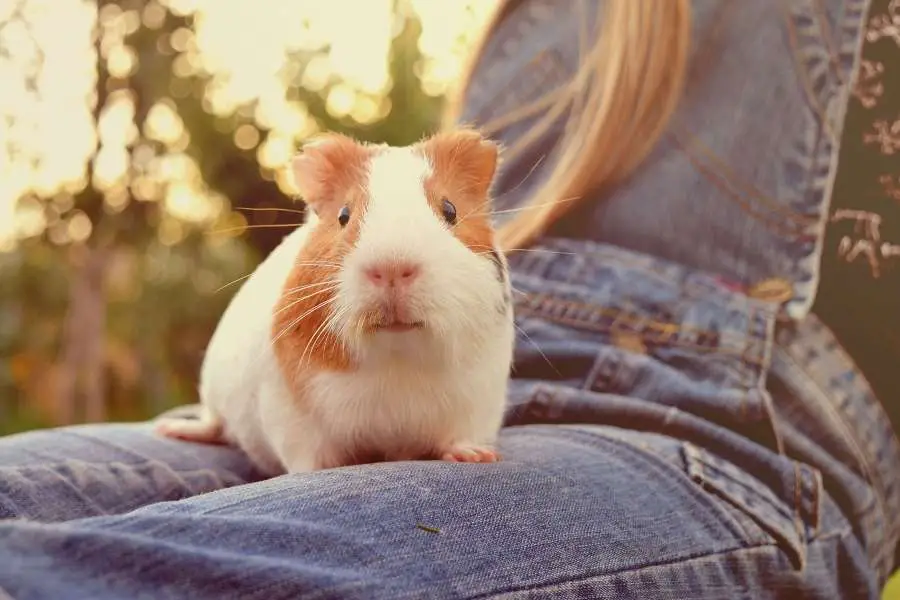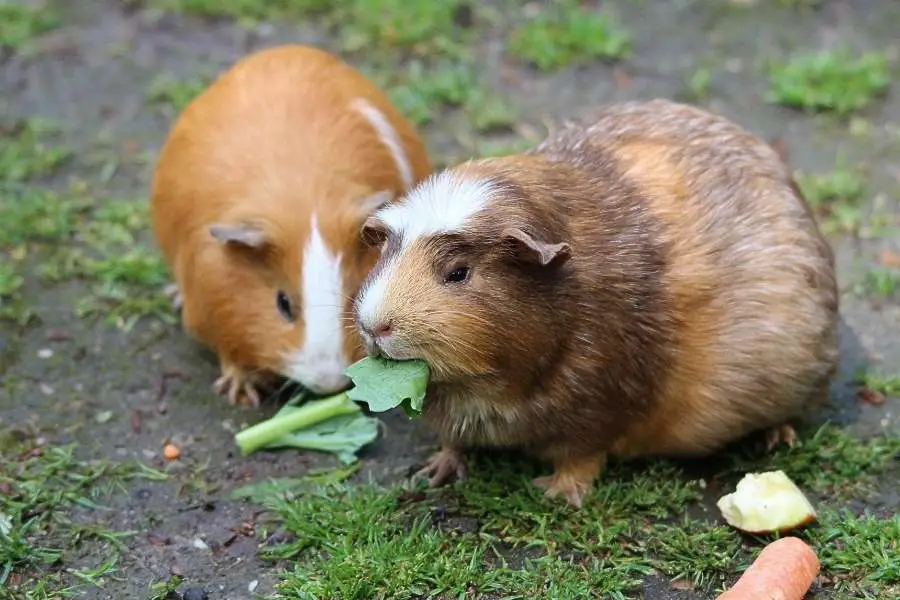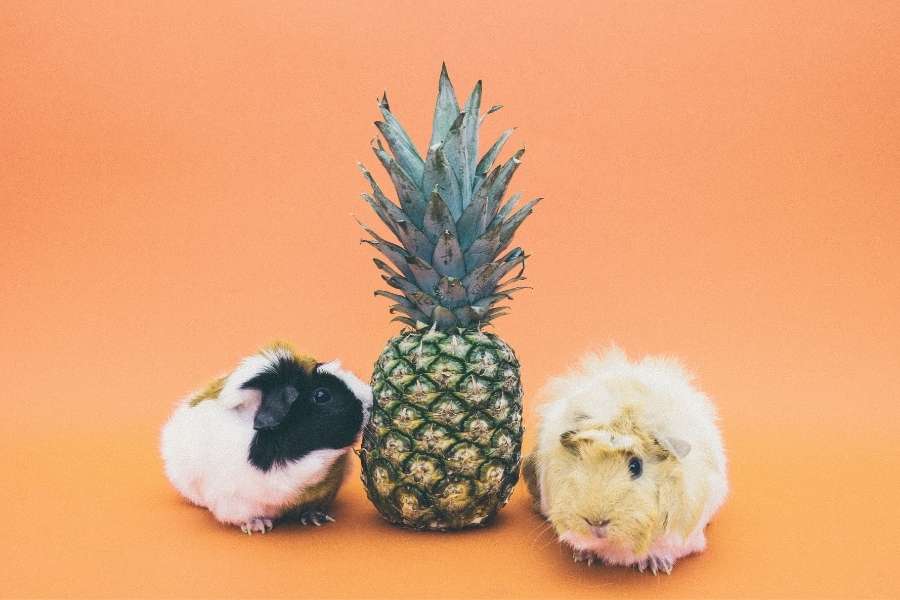One of the most basic and important ways to take care of your guinea pig is through its nutrition. Although a cavy’s diet is pretty simple and consists of mostly hay, grass, and pellets, you should feed your rodent a certain portion of fresh fruits and vegetables.
Bananas are one of the favorite fruits of humans, but can guinea pigs eat bananas? It is well known that bananas are rich in several vitamins and high in fiber, but they may not be safe for some pets. However, other animals like monkeys, birds, and elephants enjoy them without an issue. Can guinea pigs enjoy eating bananas without any risks? What foods are safe for cavies? Continue reading the article to find out.

What Should a Guinea Pig Eat?
Guinea pigs’ digestive system is sensitive, so their nutrition needs to be spot on to provide what is necessary for it to function properly.
Your cavy should be eating primarily high-quality hay and grazed grass. Since guinea pigs need a diet that is high in fiber, good quality hay and fresh grass are crucial for their digestion and dental health.
Furthermore, your furry friend’s nutrition won’t be complete with a small portion of nuggets and fresh water. However, choose nuggets that are high in fiber, and contain antioxidants, vitamins, and minerals to support its immune system. Keep in mind that this only supplements a guinea pig’s main diet which is comprised of hay and grass.
In relation, your cavy’s water bottle should always be filled with fresh, clean water, and it is best to attach the bottle to its cage.
The rest of the diet of a guinea pig can be enriched with fresh veggies and some fruity treats. But, are all fruits and veggies safe for your rodent? And can guinea pigs eat bananas? We will answer these questions in the content below.
What Foods Are Safe for Guinea Pigs?
Veggies
There is a variety of vegetables that are safe for your rodent, provide a lot of essential vitamins, and can be given on a daily basis. For example, once a day you can feed your cavy kale, lettuce (romaine, red and green leaf), or any other leafy greens. The more variety you introduce, the more nutritious foods it will consume. Try feeding your guinea pig different leafy greens each day.
Although greens should be the majority of their veggie consumption, red and green peppers, and broccoli provides a good quality of vitamin C, and they are safe to be given every day. Other veggies that can be given occasionally in small quantities are carrots, zucchini, sweet potato, tomato, celery leaves, cauliflower with leaves and stalks, green beans, parsnips, peas (leaves and pods), savoy cabbage, watercress, artichoke leaves, asparagus, brussel sprouts, red cabbage, spinach, and swiss chard.

Herbs
Herbs are another supplementation that contributes to a balanced and healthy nutrition plan for your rodent. But, herbs should be offered occasionally and in small portions. Some herbs that are safe for a guinea pig include parsley, cilantro, thyme, mint, dandelion, endive, and basil. Consult with a veterinarian before deciding to introduce new items to your cavy’s diet.
Fruits
Since their diet consists of mostly hay, guinea pigs won’t get enough vitamins and minerals if they eat only hay. That’s where fruits, and veggies, come into play. Cavies need a minimum of ten milligrams of Vitamin C per day, and they can’t produce it on their own.
In relation, supplementing their diet with fruits, and veggies is crucial. But, make sure that the fruit you are giving to your piggy is properly washed, and choose the right and safe fruit that can benefit your pet’s health.
Fruits you can give to your guinea pig in small quantities (like a piggy’s bite-size, once per week) are apple, kiwi, cantaloupe, banana, blueberry, plum, pear, cherry, watermelon, and strawberry.
Remember that fruits contain a lot of sugar, and giving your pet more than it needs can lead to weight gain and diabetes.

Foods You Should Avoid Giving to Your Guinea Pig
There is a variety of fruits and vegetables that you can safely give your cavy. And, also there are certain foods that are not very safe for your guinea pig, even though they may be delicious and safe for you.
Citrus fruits can cause tummy issues, whereas dairy and chocolate can be quite dangerous for our little furry friends. So, avoid feeding your cavy with these.
Onion, garlic, chives, mushrooms, potatoes, iceberg lettuce, tomato vine and lives, seeds, nuts, avocado – all these can be either poisonous or disturb your piggy’s digestive system.
If you notice or suspect that your pet has ingested something hazardous, take it to the veterinarian immediately.
Can Guinea Pigs Eat Bananas?
As we mentioned above, yes, bananas are safe for our furry balls of love. Let’s take a look at the nutritional benefits of banana.
Bananas and their nutritional benefits
Bananas are tasty, we can all agree on that. But, did you know that they contain antioxidants that can help with preventing cell damage caused by free radicals and thus preventing some diseases and certain types of cancer?
Furthermore, the sugar content in bananas is a little bit higher than in other fruits, but if it is given in moderation your guinea pig’s health can benefit from all the vitamins and minerals that are packed in them. Vitamins C, A, B1, and B6 support your piggy’s immune system, reproductive system, and eyesight.
Calcium, magnesium, potassium, and iron help strengthen bones and tissues and assist in muscle function. These are all present in bananas.
How Many Are Too Many Bananas?
We are all aware of the benefits of bananas, but everything should be consumed in moderation. The health of our guinea pigs can be greatly supported by nutritious bananas. However, there are several risks of feeding them to your pet.
Risks of Feeding Bananas to Your Cavy
If your guinea pig has a sensitive stomach, maybe bananas won’t be the best fruit option for the little one. Since bananas have high sugar content, eating them can disturb your piggy’s tummy or cause diarrhea only a short time after consuming it.
Also, due to the high fiber, your guinea pig may have a bloated tummy, or experience cramping and gas.
Moreover, eating bananas can cause obesity or diabetes in the long term.
Potassium in bananas helps with kidney function, but if your cavy already has kidney issues, it can cause serious problems, because its kidneys won’t be able to process the excess potassium.
Serving Size and Precautions
Whenever you give your pet something new, give it only a bite and observe its reaction. If you notice something unusual, always contact a veterinarian.
When it comes to serving size, you shouldn’t feed your cavy more than ten to fifteen grams of bananas. And, this is only if it doesn’t have any pre-existing health issues that can worsen by consuming bananas.
How Often Can I Feed Bananas to My Guinea Pig?
In relation to the above, guinea pigs without any health issues like diabetes, obesity, or kidney problems can eat a small slice of banana as a healthy treat. This serving should be the maximum you feed your cavy in a week.
So, ten to fifteen grams (small slice) of banana per week can be a great sweet treat for your furry friend.
Is Banana Peel Bad for Guinea Pigs?
While banana peels are not essentially bad for guinea pigs, they are not very nutritious either. Banana peels contain less sugar, so they may not cause diabetes, but due to the fibrous material, they can give your piggy constipation just from eating a small piece.
Also, they are not very tasty, so your cavy may not show interest in eating it.
Let’s Conclude – Can Guinea Pigs Eat Bananas?
Yes, guinea pigs can eat bananas since they are loaded with potassium, calcium, magnesium, and Vitamin C, which are essential for your cavy’s health. But, paying attention to your pet’s health as well as to the serving sizes and frequency of feeding is crucial. What is nutritious can become dangerous for your piggy’s health.
Ensure that you are giving your guinea pig this sweet treat once a week in a safe amount. Also, remember to consult your veterinarian on any kind of changes you are introducing to your pet’s diet.
